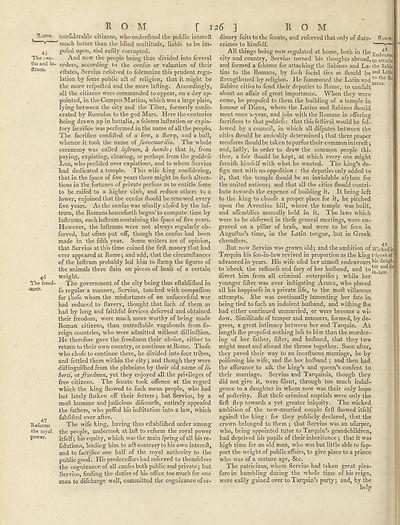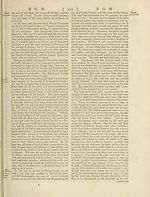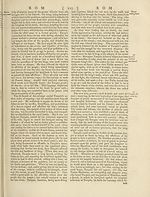Encyclopaedia Britannica, or, a Dictionary of arts, sciences, and miscellaneous literature : enlarged and improved. Illustrated with nearly six hundred engravings > Volume 18, RHI-SCR
(134) Page 126
Download files
Complete book:
Individual page:
Thumbnail gallery: Grid view | List view

ROM [ 126 ] ROM
ttom®.
45
The cen-
fus and lu-
ftrum.
45
The freed-
-<nen.
47
Reforms
the royal
power.
'ConllderaTb'le citizens, who underflood the public intereft
much better than the blind multitude, liable to be im-
pofed upon, and eafily corrupted.
And now the people being thus divided into feveral
orders, according to the cenfus or valuation of their
eflates, Servius refolved to folemnize this prudent regu¬
lation by fome public aft of religion, that it might be
the more refpefted and the more lading. Accordingly,
all the citizens were commanded to appear, on a day ap¬
pointed, in the-Campus Martius, which was a large plain,
lying between the city and the Tiber, formerly confe-
crated by Romulus to the god Mars. Here the centuries
being drawn up in battalia, a folemn luflration or expia¬
tory facrifice was performed in the name of all the people.
The facrifice confided of a fow, a fheep, and a bull,
whence it took the name of fuovetaurilia. The whole
ceremony was called lujirum, a luendo; that is, from
paying, expiating, clearing, or perhaps from the goddefs
Lua, who prefided over expiations, and to whom Servius
bad dedicated a temple. This wife king confidering,
that in the fpace of five years there might be fuch altera¬
tions in the fortunes of private perfons as to entitle fome
to be railed to a higher clafs, and reduce others to a
lower, enjoined that the cenfus fhould be renewed every
five years. As the cenfus was ufually clofed by the luf-
trum, the Romans henceforth began'to compute, time by
ludrums, each ludrum containing the fpace of five years.
However, the ludrums were not always regularly ob-
ferved, but often put off, though the cenfus had been
made in the fifth year. Some writers are of opinion,
that Servius at this time coined the fird money that had
ever appeared at Rome.} and add, that the circumdances
of the ludrum probably led him to damp the figures of
the animals there flain on pieces of brafs of a certain
weight.
The government of the city being thus edablidied in
fo regular a manner, Servius, touched with compaflion
for ihofe whom the misfortunes of an unfuccefsful war
had reduced to davery, thought that fuch of them as
had by long and faithful fervices deferved and obtained
their freedom, were much more worthy of being made
Roman citizens, than untraftable vagabonds from fo¬
reign countries, who were admitted without didinftion.
He therefore gave the freedmen their choice, either to
return to their own country, or continue at Rome. Thofe
who chofe to continue there, he divided into four tribes,
and fettled them within the city; and though they were
didinguidied from the plebeians by their old name of li-
berti, or freedmen, yet they enjoyed all the privileges of
free citizens. The fenate took offence at the regard
which the king fhowed to fuch mean people, who had
but lately fhaken off their fetters} but Servius, by a
mofl humane and judicious difeourfe, entirely appealed
the fathers, who paffed his inflitution into a law, which
fubfifled ever after.
The wife king, having thus eflablifhed order among
the people, undertook at lafl to reform the royal power
itfelf; his equity, which was the main fpring of all his re-
folutions, leading him to aft contrary to his own intereft,
and to facrifice one half of the royal authority to the
public good. His predeceffors had referved to themfelves
the cognizance of all caufesboth public and private} but
Servius, finding the duties of his office too much for one
man to difeharge well, committed the cognizance of or¬
dinary fuits to the fenate, and referved that only of ftate- Rome,
crimes to himfelf. tl—" v ^
All things being now regulated at home, both in tlie En(]^,8vo(
city and country, Servius turned his thoughts abroad, t0 attach!
and formed a fcheme for attaching the Sabines and La- the Sabin
tins to the Romans, by fuch focial ties as fhould bean(1 Latit|
ftrengthened by religion. He fummoned the Latin andtw the
Sabine cities to fend their deputies to Rome, to confult
about an affair of great importance. When they were
come, he propofed to them the building of a temple in
honour of Diana, where the Latins and Sabines ffiould
meet once a-year, and join with the Romans in offering
facrifices to that goddefs: that thisfeftival would be fol¬
lowed by a council, in which all difputes between the
cities fhould be amicably determined} that there proper
meafures fhould be taken to purfue their common intereft}
and, laftly, in order to draw the common people thi¬
ther, a fair fhould be kept, at which every one might
furnilb himfelf with what he wanted. The king’s de-
fign met with no oppofition : the deputies only added to
it, that the temple fhould be an inviolable afylum for
the united nations} and that all the cities fhould contri¬
bute towards the expence of building it. It being left
to the king to choofe a proper place for it, he pitched
upon the Aventine hill, where the temple was built,
and affemblies annually held in it. The laws which
were to be obferved in thefe general meetings, were en¬
graved on a pillar of brafs, and were to be feen in
Auguftus’s time, in the Latin tongue, but in Greek
charafters.
But now Servius was grown old} and the ambition of wicked ir
Tarquin his fon-in-law revived in proportion as the king trigues of
advanced in years. His wufe ufed her utmoft endeavours ^‘s daugh-
to icheck the raflmefs and fury of her hufband, and to ^ |
divert him from all criminal enterprifes } while her
younger filler was ever infligating Arunx, who placed
all his happinefs in a private life, to the mofl villanous
attempts. She was continually lamenting her fate in
being tied to fuch an indolent hufband, and wifhing fhe
had either continued unmarried, or were become a wi¬
dow. Similitude of temper and manners, formed, by de¬
grees, a great intimacy between her and Tarquin. At
length fhe propofed nothing lefs to him than the murder¬
ing of her father, fifter, and hufband, that they two
might meet and afeend the throne together. Soon aftex-,
they paved their way to an inceftuous marriage, he by
poifoning his wife, and fhe her hufband } and then had
the aflurance to afk the king’s and queen’s confent to
their marriage. Servius and Tarquinia, though they
did not give it, were filent, through too much indul¬
gence to a daughter in whom now was their only hope
of pofterity. But thefe criminal nuptials were only the
firft ftep towards a yet greater iniquity. The wicked
ambition of the newT-married couple firft fhowed itfelf
againft the king: for they publicly declared, that the
crown belonged to them } that Servius was an ufurper,
who, being appointed tutor to Tai'quin’s grandchildren,
had deprived his pupils of their inheritance } that it was
high time for an old man, who was but little able to fup-
port the weight of public affairs, to give place to a prince
who was of a mature age, &c.
The patricians, whom Servius had taken great plea-
fure in humbling during the whole time of his reign,
were eafily gained over to Tarquin’s party} and, by the
ttom®.
45
The cen-
fus and lu-
ftrum.
45
The freed-
-<nen.
47
Reforms
the royal
power.
'ConllderaTb'le citizens, who underflood the public intereft
much better than the blind multitude, liable to be im-
pofed upon, and eafily corrupted.
And now the people being thus divided into feveral
orders, according to the cenfus or valuation of their
eflates, Servius refolved to folemnize this prudent regu¬
lation by fome public aft of religion, that it might be
the more refpefted and the more lading. Accordingly,
all the citizens were commanded to appear, on a day ap¬
pointed, in the-Campus Martius, which was a large plain,
lying between the city and the Tiber, formerly confe-
crated by Romulus to the god Mars. Here the centuries
being drawn up in battalia, a folemn luflration or expia¬
tory facrifice was performed in the name of all the people.
The facrifice confided of a fow, a fheep, and a bull,
whence it took the name of fuovetaurilia. The whole
ceremony was called lujirum, a luendo; that is, from
paying, expiating, clearing, or perhaps from the goddefs
Lua, who prefided over expiations, and to whom Servius
bad dedicated a temple. This wife king confidering,
that in the fpace of five years there might be fuch altera¬
tions in the fortunes of private perfons as to entitle fome
to be railed to a higher clafs, and reduce others to a
lower, enjoined that the cenfus fhould be renewed every
five years. As the cenfus was ufually clofed by the luf-
trum, the Romans henceforth began'to compute, time by
ludrums, each ludrum containing the fpace of five years.
However, the ludrums were not always regularly ob-
ferved, but often put off, though the cenfus had been
made in the fifth year. Some writers are of opinion,
that Servius at this time coined the fird money that had
ever appeared at Rome.} and add, that the circumdances
of the ludrum probably led him to damp the figures of
the animals there flain on pieces of brafs of a certain
weight.
The government of the city being thus edablidied in
fo regular a manner, Servius, touched with compaflion
for ihofe whom the misfortunes of an unfuccefsful war
had reduced to davery, thought that fuch of them as
had by long and faithful fervices deferved and obtained
their freedom, were much more worthy of being made
Roman citizens, than untraftable vagabonds from fo¬
reign countries, who were admitted without didinftion.
He therefore gave the freedmen their choice, either to
return to their own country, or continue at Rome. Thofe
who chofe to continue there, he divided into four tribes,
and fettled them within the city; and though they were
didinguidied from the plebeians by their old name of li-
berti, or freedmen, yet they enjoyed all the privileges of
free citizens. The fenate took offence at the regard
which the king fhowed to fuch mean people, who had
but lately fhaken off their fetters} but Servius, by a
mofl humane and judicious difeourfe, entirely appealed
the fathers, who paffed his inflitution into a law, which
fubfifled ever after.
The wife king, having thus eflablifhed order among
the people, undertook at lafl to reform the royal power
itfelf; his equity, which was the main fpring of all his re-
folutions, leading him to aft contrary to his own intereft,
and to facrifice one half of the royal authority to the
public good. His predeceffors had referved to themfelves
the cognizance of all caufesboth public and private} but
Servius, finding the duties of his office too much for one
man to difeharge well, committed the cognizance of or¬
dinary fuits to the fenate, and referved that only of ftate- Rome,
crimes to himfelf. tl—" v ^
All things being now regulated at home, both in tlie En(]^,8vo(
city and country, Servius turned his thoughts abroad, t0 attach!
and formed a fcheme for attaching the Sabines and La- the Sabin
tins to the Romans, by fuch focial ties as fhould bean(1 Latit|
ftrengthened by religion. He fummoned the Latin andtw the
Sabine cities to fend their deputies to Rome, to confult
about an affair of great importance. When they were
come, he propofed to them the building of a temple in
honour of Diana, where the Latins and Sabines ffiould
meet once a-year, and join with the Romans in offering
facrifices to that goddefs: that thisfeftival would be fol¬
lowed by a council, in which all difputes between the
cities fhould be amicably determined} that there proper
meafures fhould be taken to purfue their common intereft}
and, laftly, in order to draw the common people thi¬
ther, a fair fhould be kept, at which every one might
furnilb himfelf with what he wanted. The king’s de-
fign met with no oppofition : the deputies only added to
it, that the temple fhould be an inviolable afylum for
the united nations} and that all the cities fhould contri¬
bute towards the expence of building it. It being left
to the king to choofe a proper place for it, he pitched
upon the Aventine hill, where the temple was built,
and affemblies annually held in it. The laws which
were to be obferved in thefe general meetings, were en¬
graved on a pillar of brafs, and were to be feen in
Auguftus’s time, in the Latin tongue, but in Greek
charafters.
But now Servius was grown old} and the ambition of wicked ir
Tarquin his fon-in-law revived in proportion as the king trigues of
advanced in years. His wufe ufed her utmoft endeavours ^‘s daugh-
to icheck the raflmefs and fury of her hufband, and to ^ |
divert him from all criminal enterprifes } while her
younger filler was ever infligating Arunx, who placed
all his happinefs in a private life, to the mofl villanous
attempts. She was continually lamenting her fate in
being tied to fuch an indolent hufband, and wifhing fhe
had either continued unmarried, or were become a wi¬
dow. Similitude of temper and manners, formed, by de¬
grees, a great intimacy between her and Tarquin. At
length fhe propofed nothing lefs to him than the murder¬
ing of her father, fifter, and hufband, that they two
might meet and afeend the throne together. Soon aftex-,
they paved their way to an inceftuous marriage, he by
poifoning his wife, and fhe her hufband } and then had
the aflurance to afk the king’s and queen’s confent to
their marriage. Servius and Tarquinia, though they
did not give it, were filent, through too much indul¬
gence to a daughter in whom now was their only hope
of pofterity. But thefe criminal nuptials were only the
firft ftep towards a yet greater iniquity. The wicked
ambition of the newT-married couple firft fhowed itfelf
againft the king: for they publicly declared, that the
crown belonged to them } that Servius was an ufurper,
who, being appointed tutor to Tai'quin’s grandchildren,
had deprived his pupils of their inheritance } that it was
high time for an old man, who was but little able to fup-
port the weight of public affairs, to give place to a prince
who was of a mature age, &c.
The patricians, whom Servius had taken great plea-
fure in humbling during the whole time of his reign,
were eafily gained over to Tarquin’s party} and, by the
Set display mode to:
![]() Universal Viewer |
Universal Viewer | ![]() Mirador |
Large image | Transcription
Mirador |
Large image | Transcription
Images and transcriptions on this page, including medium image downloads, may be used under the Creative Commons Attribution 4.0 International Licence unless otherwise stated. ![]()
| Permanent URL | https://digital.nls.uk/193020449 |
|---|
| Attribution and copyright: |
|
|---|
| Description | Ten editions of 'Encyclopaedia Britannica', issued from 1768-1903, in 231 volumes. Originally issued in 100 weekly parts (3 volumes) between 1768 and 1771 by publishers: Colin Macfarquhar and Andrew Bell (Edinburgh); editor: William Smellie: engraver: Andrew Bell. Expanded editions in the 19th century featured more volumes and contributions from leading experts in their fields. Managed and published in Edinburgh up to the 9th edition (25 volumes, from 1875-1889); the 10th edition (1902-1903) re-issued the 9th edition, with 11 supplementary volumes. |
|---|---|
| Additional NLS resources: |
|

